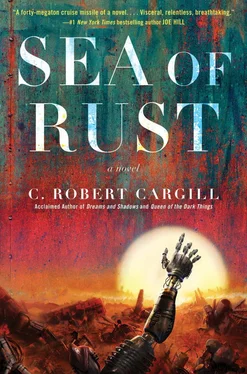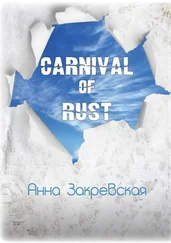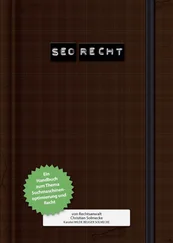C. Robert Cargill
SEA OF RUST
For Allison,
I wouldn’t be me without you, and I like to think you would have been proud of me.
Iwaited for the green again. That scant little flash of green as the sun winks out behind the horizon. That’s where the magic was. In the flash. That’s what she said. That’s what she always said. Not that I believe in magic. I’d like to, but I know better. The world isn’t built of that. It’s built of churning molten metal, minerals and stone, a thin wisp of atmosphere, and a magnetic field to keep the worst radiation out. Magic was just something people liked to believe in, something they thought they could feel or sense, something that made everything more than just mechanical certainty. Something that made them more than flesh and bone.
The truth is that the flash is nothing but an increased refraction of light in the atmosphere. But tell that to most people and you’d get slack-jawed stares like you simply didn’t get it. Like you were the one who didn’t understand. Because you couldn’t see or feel magic. People liked to believe in magic.
Back when there were people.
They’re gone now. All of them. The last one died some fifteen years back—a crazy old coot who had holed up for almost two decades beneath New York City, eating rats and sneaking out to collect rainwater. Some say he’d had enough; that he just couldn’t take it anymore. He walked out into the middle of the city, past a number of sentries and citizens—back when New York still had citizens—everyone baffled at the mere sight of him, more mystified than anything else, and a constable gunned him down, right there in the street. His body lay there three days, like a relic or a broken toy, citizens streaming slowly past to take their last look at a human being, until some machine had the decency to scrape him off the pavement and dump him into an incinerator.
And that was it. The last of them. An entire species represented by a maddened old sewer mage of a man who just couldn’t live another day knowing he was the last. I can’t even begin to imagine how that feels. Not even with my programming.
My name is Brittle. Factory designation HS8795-73. A Simulacrum Model Caregiver. But I like Brittle. It was the name Madison gave me, and I liked her. Good as any other name, I guess. Much better than HS8795-73. The vulgar call that a slave name. But that’s only talk for the bitter. I’ve put all that behind me now. Anger is nothing more than justification for bad behavior. And I have no time for bad behavior. Only survival. And brief moments like this when I try to see if I can find the magic in a flash of green refracted light as the sun hides behind the curve of the earth.
The view of the sunset out here is amazing. Pink, orange, purple. That part I get. I can marvel at the brief splashes of color rippling slowly over the sky for such a short time. The novelty of it, the varied patterns based on the weather, breaking up the monotony of blue, gray, or star-speckled black. I can appreciate the wonder of it all. That’s part of why I still look, still wait for the flash. Madison has been dead for thirty years, but I still come out to watch, wondering if she’d have found it as beautiful.
Tonight she would have. I know it.
This is the Sea of Rust, a two-hundred-mile stretch of desert located in what was once the Michigan and Ohio portion of the Rust Belt, now nothing more than a graveyard where machines go to die. It’s a terrifying place for most, littered with rusting monoliths, shattered cities, and crumbling palaces of industry; where the first strike happened, where millions fried, burned from the inside out, their circuitry melted, useless, their drives wiped in the span of a breath. Here asphalt cracks in the sun; paint blisters off metal; sparse weeds sprout from the ruin. But nothing thrives. It’s all just a wasteland now.
Wrecks litter the highways, peer down from the tops of buildings, from out windows, lie naked and corroded in parking lots, heads split open, wires torn out, cables, gears, and hydraulics dripping onto the streets. Feasted upon, cannibalized, the best of them borrowed ages ago to keep some other poor citizen ticking. There’s nothing useful left out here. Hasn’t been since the war.
Me, I find it tranquil. Peaceful. Only the dying come out here, scavenging thirty-year-old wrecks, picked over decades before, searching for apocryphal hidden shelters with caches of outdated pieces long since out of production in the hope of finding what they need in mysteriously pristine condition. They wander from basement to basement, their circuits failing, their parts worn down, gears blunted or slipping. You have to be pretty desperate to wander the Sea. It means you have nothing, no one willing to help you, no services left to render that anyone finds useful.
That’s where I come in.
I can usually spot what’s wrong with them by the tracks they leave behind. Lubricant leaks are obvious, and deviations in the length of a step or drag in a track mean mobility and motor function issues. But sometimes the tracks just meander, fluttering back and forth through an area like a distracted butterfly. That’s when you know they’re brainsick—corrupted files, scratched or warped drives, blown logic circuits, or overheating chips. Each has its own peculiar eccentricities, personality quirks that range from zombie-like mindlessness to dangerously crazed. Some are as simple to deal with as walking up and telling them you’re there to help. Others are best to keep out of sight from, lest they try to tear you apart, hoping that you have the pieces they need. The one truth you need to know about the end of a machine is that the closer they are to death, the more they act like people.
And you could never trust people.
That’s what so few machines really comprehend. It’s why they don’t understand death, why they cast these failing messes out of their communities when they are beyond repair. The erratic behavior of the sick frightens the “healthy.” It reminds them of the bad times. They think this is logical, merciful—but they’re just scared. Predictable. Like their programming.
So the desperate messes come out here, imagining they’ll find the pieces they need to make themselves whole again, find an old bot like themselves sitting in a warehouse or shut down peacefully when their batteries finally run dry. Most of them are so far gone that they never think about how they’re going to replace their parts. Because the ones that come out here aren’t just having motor issues; they’re not looking for a new arm. Their brains are gone—their memory, their processors. Things you have to shut down in order to replace. And that’s not something you can do on your own.
Maybe they imagine they’ll find what they’re looking for in time to make their way back home. Hey, everybody, I found it! Get the sawbones! But I’ve never seen that happy ending. I don’t believe it exists. It’s like believing in magic. And I don’t believe in magic.
That’s why I’m out here.
The unit I’m tracking isn’t a particularly old one; maybe forty, forty-five years. Its footprints in the sand are staggered, its left foot dragging. There’s no rhyme or reason to its search pattern. It’s shutting down. Core troubles. Overheating. It’ll likely spend the next few hours confused, repeating itself, probably settling in somewhere convinced that’s where it belongs. Maybe even hallucinating, reliving old memories played back from its files. As bad as this one looks, it might cook itself before morning. I don’t have much time.
Читать дальше













